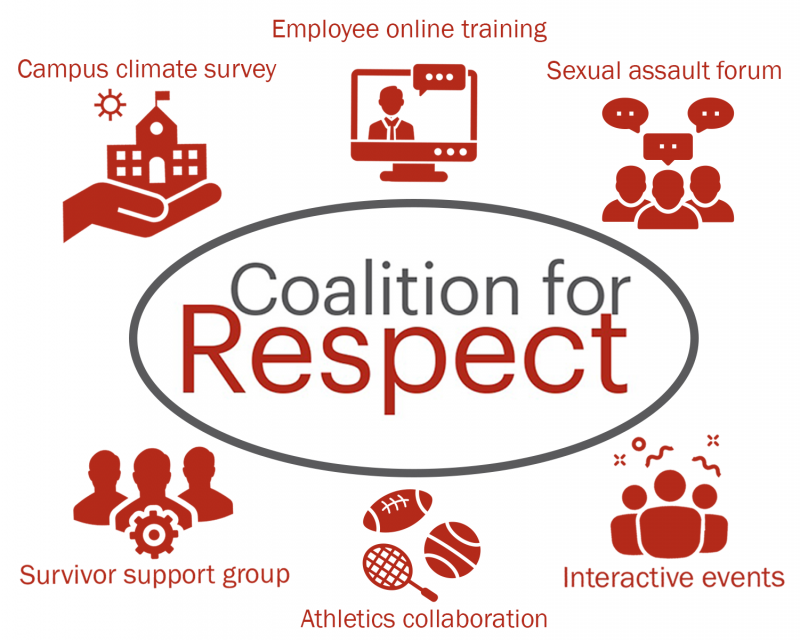The Coalition for Respect will take a hiatus of indeterminate length due to low attendence by students at Coalition meetings. This announcement follows a trend of decreased student engagement in the previous few years. The process that handles sexual assault cases will not be on hiatus, and cases will still be heard and prosecuted.
The Coalition for Respect works to reduce sexual assault and harassment that occurs on campus through educating Trinity members about sexual assault and misconduct — usually through the use of events, posters and guest speakers. The idea is to involve every part of Trinity in discussing the best methods of policy and education on sexual assault.
While plenty of students show interest in the Coalition, with high numbers of students signing up to join, those numbers don’t transfer over to the meetings, which are dominated instead by faculty and staff.
“I think in this past year, we got to the point where it was like, maybe the coalition has outlived its purpose,” said David Tuttle, dean of students and chairman of the Coalition. “There’s no question that sexual assault and Title IX violations are still an issue, there’s no question we’re going to address those and take those seriously. And I don’t believe that students are indifferent about sexual assault, I think they still care about it, I think the question is how do we get students to feel like they’re partners in addressing the problems that any campus deals with.”
While the Coalition is on hiatus, they will be trying to increase student engagement within the organization and work to see the structure of the group moving forward.
“I hope we can use this time to gauge more interest in the organization and what it is we want to accomplish in the next few years,” said Simone Washington, junior member of the Coalition.
According to Tuttle, if student’s engagement with the Coalition remains low, then a new type of organization will have to be created that will be more staff-based.
“If we’re trying to talk about what is the climate out there on campus, what issues are out there, what would be effective education and prevention, and the people at the table are all staff members, then number one it’s not a coalition, and number two we’re missing out on the key element, which is student participation,” Tuttle said. “Do we continue to have a Coalition if it’s not really a coalition?”
The Coalition has made offers to hold discussions with fraternities, sororities and athletic teams. There, the Coalition would answer any questions about Title IX and Trinity’s policy and procedures regarding sexual assault.
“We just weren’t invited. We were invited to one sorority meeting, and we were 15 minutes of their agenda and it was pretty obvious that they just wanted to check it off that we came and we spoke and they wanted us to leave,” Tuttle said. “Which was too bad, because we should have a whole meeting to really go deep and talk about things.”
Tuttle is currently scheduling a meeting with the student athlete advisory council and will soon be contacting the Student Conduct Board, ResLife staff and Greek Council again. The plan is to solicit their support by having some members from these councils on the Coalition.
“And see, the question is, do they want to do this? And if they do, then will they commit to having some representation when we have meetings,” Tuttle said. “And then if they say they do but they don’t show up, then I think that will be an indicator to us that maybe the Coalition’s time has come.”
The Coalition is only in its fourth year. At its inception, the Coalition was intended to bring together the many members of the Trinity community to discuss sexual assault on campus.
“We needed to invite the community into the conversation and into the process in a lot of different ways so that people could see this wasn’t an administration versus student issue, that it was a partnership between students, faculty, staff, administration, to try to address issues of sexual assault, to try to do education, to try to do prevention,” Tuttle said. “So that was kind of the backdrop of having the Coalition.”
With the Coalition, Washington works to learn Trinity’s sexual assault policy and report back to the coalition about the campus culture around the issue of sexual assault.
“When I first learned of the organization, I felt personally obligated to join. A coalition of faculty, students and community members that met for the express purpose of addressing sexual assault on Trinity’s campus? I thought, ‘Sign me up!’ ” Washington said.
As a student member of the Coalition, senior Holly Gabelmann attends the meetings with the faculty and staff to provide a student perspective on discussions about the issue of sexual assault.
“I am careful to acknowledge that I cannot speak for the entire student body; I can really only speak to my experiences and understanding of this campus,” Gabelmann. “I hope that more students will join to help diversify the perspectives heard at meetings.”
The Coalition is responsible for programming for first-years during orientation that addresses sexual assault. This year, the orientation lecture was called Triage and it touched on sexual assault, shootings, mental health and alcohol.
“We’ve gone through a number of programs and, to me, it’s just partly the delivery method for upper-class students is a little more challenging,” Tuttle said. “They’re required to go to something that’s about sexual assault or alcohol, [and] a lot of students feel like they’ve heard this stuff before and a program has to be very engaging for students to pay attention to it.”
Students are still welcome to join the Coalition for Respect; the first meeting will be scheduled when the Coalition is back from hiatus.







